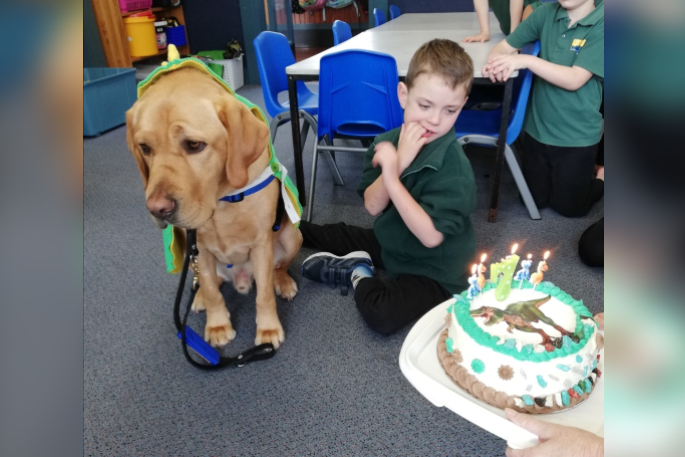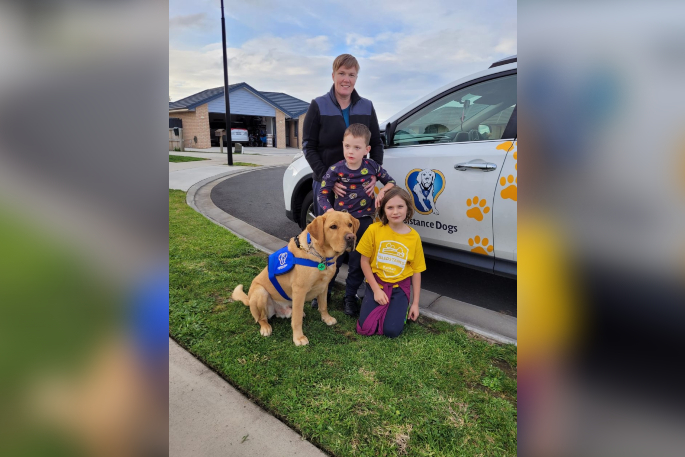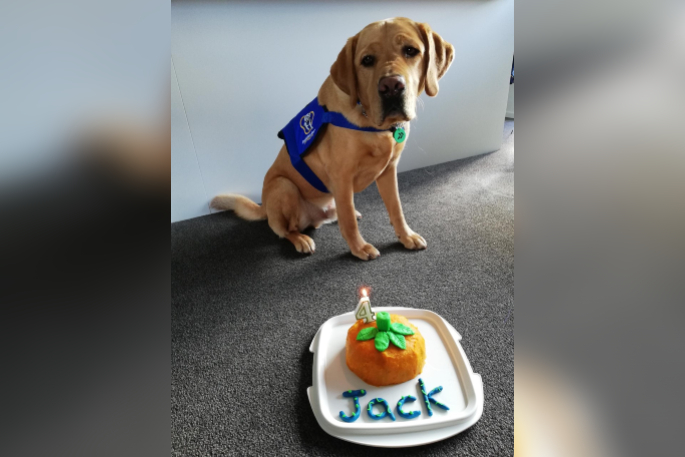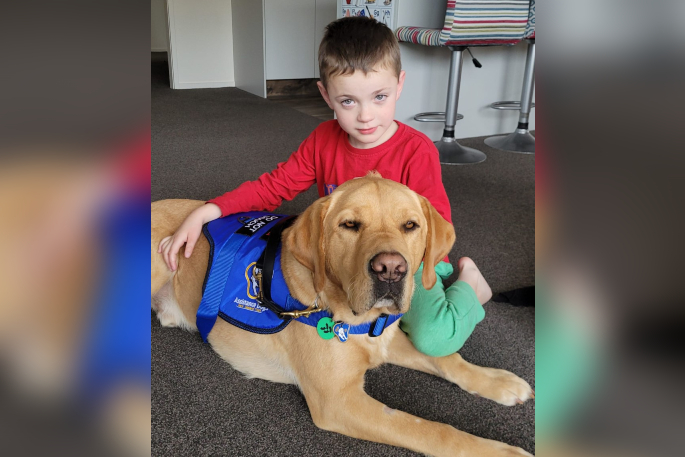Newly graduated Assistance Dog Jack provides crucial support for Bay of Plenty-based Callum, allowing the Newman family to begin to enjoy life again.
Callum was diagnosed at three months old with a range of neuro-disabilities, including Cerebral Palsy and Epilepsy, both of which present several associated behaviours and challenges for solo mum of two Melanie.
Since his diagnosis in November 2015, life has been a constant challenge as Callum's needs became all-consuming.
His epilepsy has had significant impact on the family's ability to go out and enjoy life together as he suffers from daily and nightly seizures, involving regular ambulance callouts, hospital visits and 24/7 monitoring.
The Newman's are sharing their story as Assistance Dogs NZ Trust (ADNZT) fundraises during their Annual Appeal month of September, petitioning to the public to help fund the training and placement of more life-changing Assistance Dogs. With the reduction in cash giving and over 50 families still waiting for their dog, the trust has been virtually shaking their buckets this year, aiming to raise $75,000 to fund their vital work.
This will continue to address the escalating need within the New Zealand disabled community for assistance dogs that offer independence and crucial daily aid. ADNZT trains specialist public access dogs under Assistance Dogs International accreditation for clients with various neuro-disabilities including Autism and Cerebral Palsy.
In June, ADNZT's Jack was matched with Callum and delivered to his family home in the Bay of Plenty to begin his placement programme with the team. When Jack arrived – Callum's reaction was one of immediate adoration.

Photo: Supplied.
'Callum is extremely genuine in displaying his emotions and has no filter. You could see the joy on his face the moment he locked eyes with Jack. The more they played together, the more Jack's tail kept wagging and Callum was so happy – it was such a special moment to be a part of”, explains mum Melanie.
During the two-week training programme with ADNZT staff – Mel learnt how to become Jack's primary handler, with Callum at his side.

The training involved learning his commands, heading out into places they would regularly need to go and interacting with their community. During this time they also simulated scenarios with Callum, such as hospital visits, school assemblies and trips.
At home, they fine-tuned his training to ensure Jack could perform all the tasks that Mel and Callum would need to make life a little easier.
Jack's purpose and training will continue to develop as he settles into life as a qualified working dog with his new family. Currently he performs tasks such as picking things up for Callum and lying on his stomach applying calming pressure when Callum has a melt-down (for his safety and comfort).
In these instances, Jack can help calm Callum quickly, turning screams into giggles as he nudges his new friend for cuddles and kisses.
They both enjoy playing together and lots of touch, and it's clear that both Callum and Jack are having as much fun as each other wrestling and cuddling around the home.

Photo: Supplied.
Jack has become another member of the Newman family – primarily caring for Callum, but also providing new opportunities for the family to go out and enjoy their time together, something that was often too stressful to do before. They have gone to the beach and enjoyed swims, played fetch in the park and taken a little more time to slow down and appreciate each day.
As the pair develop and Callum grows, Mel hopes Jack will continue to support his seizures through the night and learn new tasks to support Callum's future development and behaviour. For now, it's clear that her son has found a best friend and life has become a lot happier.
The charity has begun to increase capacity over the past 18 months as they start to recover from COVID-19 lockdowns and are currently able to output 10 trained dogs per year. Plans are to increase this to 18-20 dogs trained annually by 2025, a goal that can only be made possible by the continued support of the public.
Established in 2008, ADNZT services 40 clients around New Zealand and has 25 puppies in training. With their waitlist over 5 years long with over 50 families on the list, they know the only way to address this need is to increase their breeding, dog training, volunteer base and client service capacity.
Funding Manager, Alex Williams, explains that, 'The Trust doesn't receive any government funding, and is funded solely by generous donations, grants and individual donors, including our puppy sponsorship programme.
'That's why our Annual Appeal month is critical to fund the ongoing costs of training our dogs and providing life-long support for the families in our care. With the reduction is cash and street collections, we've moved much of our fundraising online and have asked supporters to virtually shake their buckets for us if they're not comfortable fundraising public.”
The hard cost of training, placing, and supporting an Assistance Dog throughout their working life is $75,000 (which covers 2 years of development and training, and ongoing support until retirement at 11 years old).
Assistance Dogs NZ Trust's 2022 Appeal month runs to the end of September, calling for any donations you can make to street collectors this Friday and Saturday in Auckland, Hamilton, Tauranga, Wellington and Christchurch, or online at www.assistancedogstrust.org.nz.



1 comment
How could you not want to support these dogs?
Posted on 24-09-2022 15:19 | By morepork
This is a great story and shows some of the non-obvious benefits from both children and adults getting trained dogs for support. They need $75,000... "...a goal that can only be made possible by the continued support of the public." Why is that? Why is this not funded by Government? It's "petty cash"... Our appointed Commissioner spends $300,000 a year on her expenses, the government can waste millions on pointless publicity campaigns, but a truly worthwhile cause, that can benefit Kiwis in so many ways, has to go cap-in-hand to the public, who are simply overwhelmed and bewildered by all the good causes that need our support. I can't imagine ANYBODY being upset if this trivial (in the scheme of things) amount was taken out of the War Chest of Other People's Money that the government is so good at spending on their own agendas.
Leave a Comment
You must be logged in to make a comment.